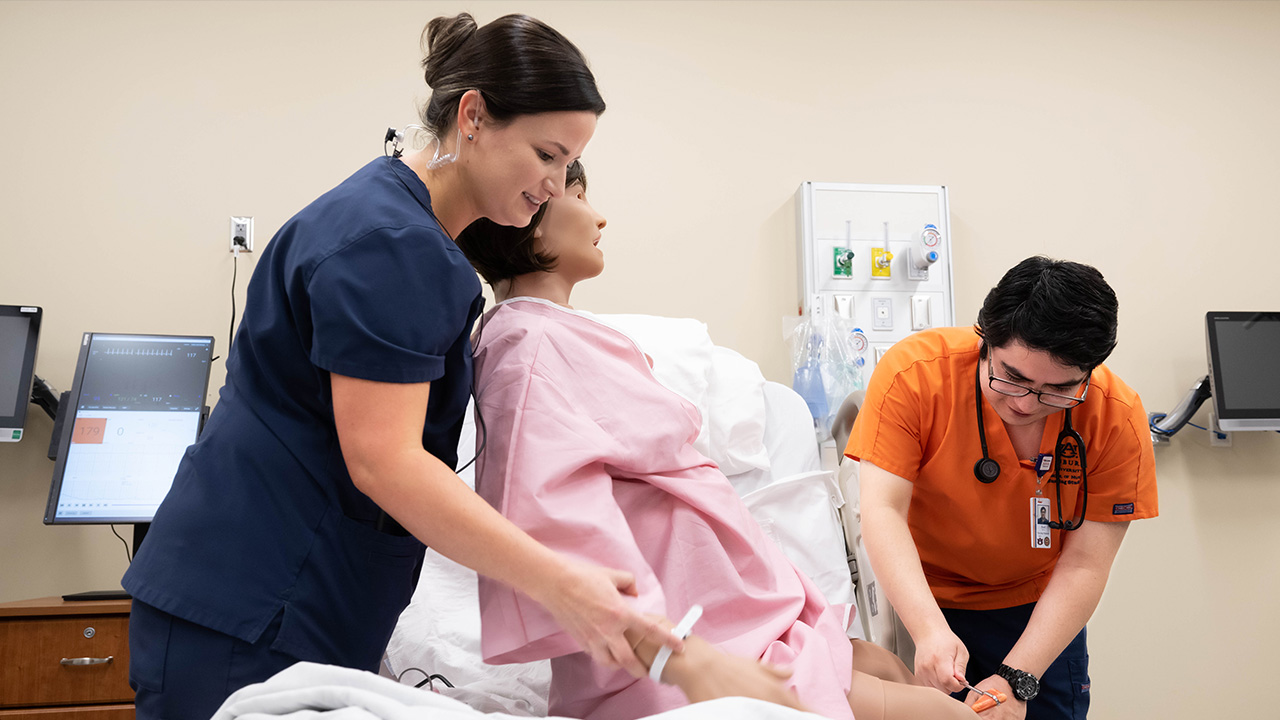content body
According to industry research, nearly one in five new nurses is so overwhelmed they leave the profession within their first year on the job.
With the goals of improving health care providers’ retention rates and combatting the nursing shortage in Alabama, Auburn University’s College of Nursing (CON) is the first four-year institution in the nation to establish an apprenticeship program. The program is a partnership with the Alabama Board of Nursing, the Alabama Office of Apprenticeship and East Alabama Health (EAH).
“Our hopes are that because the apprentice students have been exposed to the hospital culture and to nursing units throughout the hospital, our new graduates will stay at EAH for that first year and beyond,” said Hope Carroll, CON’s clinical placement coordinator. “Because it was so well thought out by the Board of Nursing and the Alabama Office of Apprenticeship, it’s a program that can meet the needs of both non-traditional and traditional students.”
The first cohort of nurse apprentice students began in fall 2022. Currently, CON has 18 students in three different cohorts at EAH, with another cohort set to start in spring 2024.
The program offers nursing students many benefits, not the least of which is the hourly wage they earn while simultaneously completing required course clinical hours. They also receive tuition remission and work closely with a nurse mentor to gain hands-on clinical experience.
Nurse apprentices complete the same number of clinical hours as traditional students, but the difference is they earn an hourly wage and are paired one-on-one with a nurse mentor.
Hands-on learning
Each student in the apprenticeship program works one-on-one with a nurse mentor at EAH, allowing the apprentice to build rapport with the health care team and providing numerous opportunities to practice patient assessment and clinical skills while also meeting course objectives.
Nursing student Charnae Simon was ready to apply for the apprenticeship program the minute she heard she would have one-on-one time with a mentor.
“I am a visual and hands-on learner and struggled at times placing our lectures into a picture,” Simon said. “I can personally see the confidence I have now when I am stuck between two options. I place myself with my mentor and visualize what we would do in the situation.”
Money for tuition, books and more
Nursing students are required to complete specific clinical hours each semester. Nurse apprentices complete the same number of clinical hours as traditional students, but the difference is they earn an hourly wage and are paired one-on-one with a nurse mentor. These students have an additional work requirement at EAH, as well as the opportunity to work extra hours, and their tuition and books are covered through the program.
“We’ve seen GPAs go up, test averages are better and time management skills have improved,” Carroll said. “The students have more of a work-life balance because many of them previously held jobs outside of health care that made it difficult to have adequate time to study and complete coursework.”
National Apprenticeship Program
While the U.S. is celebrating National Apprenticeship Week Nov. 13-19, CON is celebrating the success of its students in the apprenticeship program.
“The goal of the apprenticeship program is to retain nurses in Alabama,” nurse apprenticeship coordinator Abby Bell said. “We hope in a couple of years we see our apprentices becoming mentors.”
For more information on CON’s student nurse apprenticeship program, contact Abby Bell at aja0016@auburn.edu or Hope Carroll at hpc008@auburn.edu.
Want to know more about academic programs in the College of Nursing?
Read more




